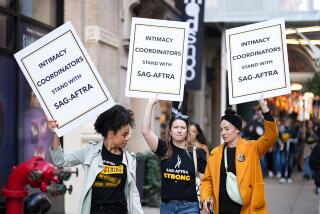SAG-AFTRA establishes code of conduct to combat sexual harassment
SAG-AFTRA, the union representing about 160,000 actors and other performers, is trying a new approach to protect its members from sexual harassment amid a wider reckoning in Hollywood over misconduct.
The guild has released a code of conduct that outlines best practices for the handling of workplace sexual harassment. Its slogan: “STOP. SUPPORT. REPORT.”
The seven-page code — which is effective immediately — defines the different types of harassment that performers face, explains the obligations of employers with respect to mistreatment, and offers recommendations for reporting abuse, among other elements.
“To end the pervasive culture of inaction and silence, we must not look the other way. We must intervene to STOP the conduct when we see it, SUPPORT those who speak up, and REPORT the conduct,” the code reads.
The code was unveiled Saturday at a meeting of SAG-AFTRA’s board of directors in Los Angeles. It supplements existing rules governing workplace conduct that are part of the union’s master contract.
The guild’s effort comes as other show business groups — following the disclosures of alleged sexual misconduct of dozens of high-profile Hollywood figures — are also examining their rules and regulations. The Producers Guild of America, the Writers Guild of America, and the Academy of Motion Picture Arts and Sciences have each released new guidelines for members’ conduct in recent months.
It is an issue that has been gaining momentum. Actress Emmy Rossum, best known for her starring role on Showtime’s “Shameless,” tweeted in January about the need for more rigorous standards for filming nude and sex scenes.
“We also need to be discussing simulated sex, sexuality and nudity in our storytelling,” Rossum wrote. “There are guild protocols in place and contracts designed to protect actors, but we can do better. These are sensitive situations, especially for young actors looking for a break.”
The code is part of a new initiative by the union to ensure safe working environments for performers. In a letter to union members, SAG-AFTRA President Gabrielle Carteris and National Executive Director David White said that the multi-year effort would “yield sustained improvements to the safety and treatment of our members as they work and pursue employment.”
The initiative, called “The Four Pillars of Change,” will focus partly on education, according to the letter from Carteris and White, and will see SAG-AFTRA provide training, expert panels and other educational programming so that union members “have practical tools available to them when confronted with or witnessing harassing behavior.”
Controversies over nude film scenes occasionally erupt, prompting the guild to intervene on behalf of its members.
Such was the case in 2015, when the production of HBO’s “Westworld” drew attention over a consent form given to extras who were to appear in an orgy sequence. The nudity agreement, from a third-party casting agency, said that the actors could be “required to perform genital-to-genital touching,” among other acts.
After SAG-AFTRA interceded publicly, the document was revised to make clear that performers could withdraw from the project if they felt uncomfortable.
Speaking at the Screen Actors Guild Awards last month, Carteris addressed the #MeToo movement that is highlighting misconduct in the business, and the need for change in the industry.
“Our commitment to safe workplaces, inclusion, and creative and economic equality; these are the things — these are the things that make us stronger,” she said. “At SAG-AFTRA, we fight for the actors, broadcasters and recording artists worldwide who we represent and protect.”
UPDATES:
Feb. 12, 2:45 p.m.: This article was updated to include additional background on the issue of nudity on film sets.
This article was originally published at 9:45 p.m. on Feb. 10.
More to Read
Inside the business of entertainment
The Wide Shot brings you news, analysis and insights on everything from streaming wars to production — and what it all means for the future.
You may occasionally receive promotional content from the Los Angeles Times.











